Frustrated by Genetic Testing? Me Too.
Genetic testing is scary, frustrating, time-sucking and expensive.
The first time I ran I got my genetic testing report back, my heart sank. Fear ran down my spine and gave me a sick feeling in my gut which lasted for hours. Ok. Days.
When I got my genetic testing report back, I immediately looked for the ‘red’ and I had plenty of it. That was a scary moment.
The real fear though occurred later when I got three reports back on my sons’ genetics. They had tons of ‘red’ as well. As a father, and a mother, you want the best for your kids. “What did I give my children?!” is the thought that screams through your head.
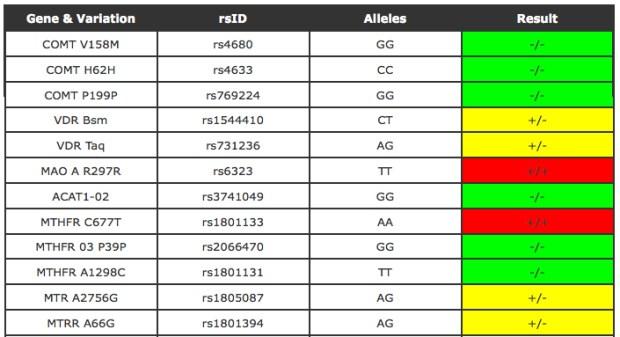
I wrote about this experience back in 2012:
We All Have SNPs
I consider SNPs the ‘spice of life.’ They contribute positively to genetic variation and allow us to act differently, experience things differently and adapt differently.
Life wouldn’t work with 100% Type A people running around nor would it work with 100% of chilled-out folks laying around.
Each one of us has about 50,000 SNPs on board.
When you get your genetic testing report back, I know the first thing you do is look for the ‘red’. When you find it, you do what I did years ago – FREAK OUT.
What you are seeing means one thing: You are different than someone else. That’s it.
That’s a good thing.
Most SNPs Mean Absolutely Nothing
You get that 45 page genetic testing report and just look for which of your genes are ‘red’. The ‘green’ genes mean nothing to you. Those ones are fine and you move on looking for more ‘red’.
I did this, too.
Then I realized that ‘red’ means nothing most of the time. This realization took me years…years…to occur.
Looking at a genetic SNP in isolation is like finding a blue grain of sand on the beach and calling the beach blue. You excitedly show your friend the blue grain of sand and exclaim, “Look! I found a blue beach!” Your friend looks at you oddly and says, “No. You found a blue grain of sand. The beach is brown. Look.’ Irritated and confused, you see a brown beach in front of you but still focus on the blue grain of sand and defend your stance, “Yes true but I still have a blue grain of sand and it is definitely impacting the color of the beach.”
Is it?
My research team has spent years reviewing SNPs in the medical literature.
We have found that the absolute majority of SNPs are not altering gene expression.
When A SNP Matters
In order for a SNP to matter it has to contribute to altered function:
- reduced, or increased, ability for a vitamin, mineral or other cofactor to bind to the enzyme thereby allowing it to be read
- reduced, or increased, ability to be turned off by an inhibitor or end product
- reduced, or increased, ability to be turned on by a promoter or substrate
There are a number of SNPs which do impact how a gene may function. Some well-known SNPs are:
- MTHFR C677T – may slow the MTHFR enzyme down by 30% if one copy and 70% if two copies
- COMT V158M – may slow the COMT enzyme down significantly if one copy and even more if two copies
- COMT V158M – may speed the COMT enzyme up significantly if no copies are present
- MTHFD1 G1958A – may slow the MTHFD1 enzyme down significantly
Most Genetic Testing Reports Mean Nothing
When you get your genetic test report back and you see this, you immediately think you have a problem in the GAD1 gene – there is a ton of red here. This lady did believe she had an issue as you can see below:
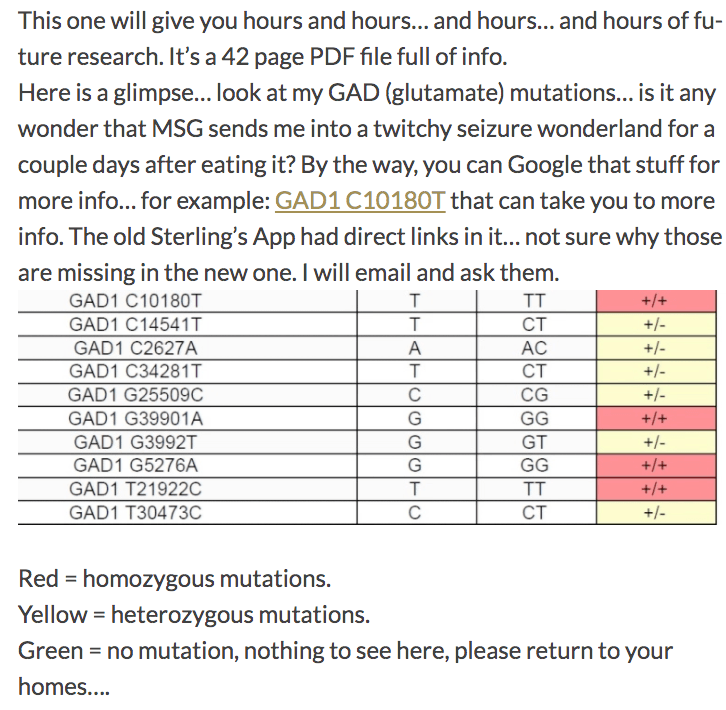
I used to.
I used to think this was a big big deal and was a big contributing cause to high glutamate in the brain.
High glutamate in the brain is linked to:
- insomnia
- headaches
- migraine
- MSG sensitivity
- irritability
- anxiety
Do you have any of those?
Yeah – likely. We all struggle with these at times. Some more than others.
We want to make linear associations between what can be causing our symptoms and what they are. It’s the easy thing to do. Easy is easy.
Yet, it is the wrong thing to do.

Are these GAD1 SNPs the cause of your symptoms above?
NO.
Not these ones anyhow. The GAD1 SNPs above are NOT clinically relevant. There is no evidence that these SNPs are actually causing the GAD1 gene to alter its function.
Are there GAD1 SNPs which are problematic? Yes, but currently 23andMe does not have any of them.
From my research team:
@drbenlynch Ali looked at GAD again last summer…but I think only vetting 23andMe SNPs and decided insufficient evidence. We have not gone back to look at all GAD SNPs possible, meaning those not covered by 23andMe. I will keep this paper in mind for later.
When Dr Green started back up on the GAD research, here is what she found:
@drbenlynch Well, I am not done with GAD yet, but it is getting abundantly clear, messed up GAD is not about SNPs. It is about epigenetics: from prenatal immune activation/viral infections, toxin exposures in utero and over early childhood and adolescence plus other insults (poor nutrition, cannibus, etc. ) that result in dysregulated methylation patterns of CpG dinucleotides at the GAD1 proximal promoter. “Subjects with schizophrenia showed a significant, on average 8-fold deficit in repressive chromatin-associated DNA methylation at the promoter. These results suggest that chromatin remodeling mechanisms are involved in dysregulated GABAergic gene expression in schizophrenia.” Attaching an excellent summary from 2015 here.
I am going to start focusing more on that for GAD GAD/SCZ review ….epigenetics.
Meanwhile there is the whole piece about GAD and insulin/diabetes. Do you want me to look at that angle too? A ton to wade through and i think important.
No SNP? Problem May Be Present
Let’s revisit this comment made about GAD1 SNPs:

Recall she linked her many ‘red’ GAD1 SNPs to her sensitivity to MSG.
What stands out above to you – anything?
Comment below if you caught it. It is glaring to me.
“Green = no mutation, nothing to see here, please return to your homes…’
Important! – The LACK of a SNP does NOT mean the gene is FINE
How Genes Really Are Affected
If the majority of SNPs controlled our fate, then why have they been selected for all these years?
Clearly there must be some evolutionary advantage to them.
That aside, SNPs are NOT the main driver of genetic expression.
Epigenetics is.
Epigenetics is what controls how your genes are turned on or off.
SNPs do not do this – well – very few of them do.
Your SNPs are not the culprit.
You are.
What Controls Your Genetic Expression
- dietary choices
- mindset (yes – it matters big time)
- sleep
- exercise – too much is just as bad or worse than too little
- breathing pattern and style
- environmental exposures – pesticides, herbicides, heavy metals, phthalates, BPA, car exhaust..
- stressors – EMF, overtraining, yelling, screaming, bad news (media)
- community and loved ones
- vacations and hobbies
- connectedness to nature and surroundings
- nutrition – vitamins, minerals, protein, carbs, fats
- infections – viral, bacterial, parasitic, lyme..
- toxins – mold, tetanus..
- hormones – estrogen, testosterone…
- time of day / night
- sunlight
Are any of these found in genetic testing results?
Sadly – no.
Just SNP based information – in isolation.
Huge issue.
Common Misconceptions About Genetic Testing
- Red +/+ = Bad
- Yellow +/- = Less Bad
- Green -/- = Good – no problem
If red +/+ = bad then why have we evolved to have this SNP present in many of us? Yes, some are rare but some are also very common, like MTHFR C677T ++ and COMT V158M ++
Benefits to MTHFR C677T ++:
- ability to focus longer
- ability to recover from sunburn better as more folinic acid is available
- ability to recover from infections or wounds better as more folinic acid is available
Benefits to COMT V158M ++:
- better looking and healthier skin
- more estrogen available
- ability to focus longer
- ability to sense danger faster
If yellow is less bad, then why have we evolved with this?
A COMT V158M +/- appears to offer the ‘perfect’ balance of dopamine according to many researchers.
If green is good, then why do many people still have issues with that particular gene?
Epigenetics.
“Cool, I don’t have any GAD1 SNPs so my glutamate levels are fine.”
Wrong.
Epigenetics is Key.
Look.

In order for GAD to work, it must have vitamin B6 available.
If your GAD genetic report was all green, this doesn’t mean your glutamate levels are fine – not at all.
Does this mean you need to run out and buy vitamin B6? No. My point is in order for you to convert glutamate to GABA, this nutrient is needed.
Stop focusing on the SNPs.
Start focusing on:
- what nutrients enzymes need in order to work
- how genes are slowed down
- how genes are sped up
- clinically relevant SNPs – not the many thousands of SNPs which have NO relevance at all
Here is another example of how your GAD gene can be affected:
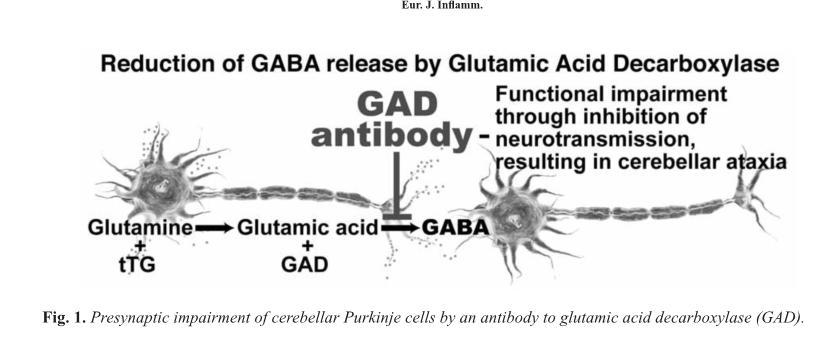
Your GAD enzyme can be slowed down to a halt if there is an antibody binding to it.
Stop focusing on the GAD SNPs.
Start focusing on how genes are affected.
PLEASE.
“Antibodies against GAD have been described in stiff person syndrome, insulin-dependent diabetes mellitus (IDDM), and autoimmune polyendocrine syndromes, as well as in some immune mediated ataxias. These antibodies are present in at least 60% of both patients with gluten ataxia and patients with CD and no neurological manifestations. Furthermore, the levels and positivity of these anti-GAD antibodies can be significantly reduced by the introduction of a gluten-free diet in both of these patient groups. Of the patients with neurological manifestations, who also have an enteropathy, the prevalence of these antibodies is 96%.”
Trendsetter or Fad Follower?
Which one are you? Personally, I am a trendsetter. I enjoy challenging the status quo and fighting for what is right.
I could quickly – and very easily – make yet another genetic report showing a bunch of GAD SNPs and others and link to a product for reducing glutamate.
Is this profitable? Absolutely.
Is this right? Absolutely NOT.
Is it popular? Unfortunately.
Are customers clamoring for it? Unfortunately.
Doing the Right Thing is Hard
By ordering a genetic testing report, looking for red and yellow and hitting one-by-one with a supplement is easy.
Sorry – it’s stupid.
It’s a trap which one can easily fall into.
I did.
I climbed out.
Let’s say you ordered your genetic report and see a bunch of ‘red’ GAD and you are confident it is the cause of your issues.
You find out that you need to take vitamin B6 and reduce glutamine supplements.
First of all, by swallowing that vitamin B6 capsule, do you really think that nutrient is going to bind to that specific gene and cause it to function in isolation?
Many do.
It doesn’t.
Vitamin B6 works on over 100 different enzymes in the human body. You are not just targeting the GAD gene by swallowing B6 – you are impacting potentially a 100 genes.
What if your ‘red’ GAD enzyme is fine yet you ‘take action’?
The ‘red’ GAD on your genetic testing report triggered you to:
- panic which negatively impacts countless genes and uses up countless nutrients
- buy a supplement which costs money
- avoid certain things causing further stress
Two weeks later, you realize:
- You feel no effect or actually worse
- You stop ‘treating the GAD SNP’
- You look for yet another ‘red’ gene which is ‘bad’
- You restart the process all over again – more money, more stress, more panic, more frustration, more time spent
You give up.
You thought genetics was the answer. You really did. You gave it your all.
No doctor helped you. They all ran different reports only to further chase the ‘red’ genes and guess what you need based on a genetic report without any clinical relevance.
Stop Guessing. Stop Wasting Time. Learn.
If you are asking the right question and you get an answer, it may be the right answer.
If you are asking the wrong question, there is absolutely no way you will get the right answer.
“What SNP is causing my headache or MSG sensitivity?” is the wrong question.
SNP Chasing is not the right answer.
‘Reds’, ‘Yellows’, ‘Greens’ are easy to pinpoint but as you’ve painfully learned – it does not work long term.
Yes, you may get lucky and you may have actually needed those nutrients or life-changes but it was a guess.
You’ve learned by now – if you’ve read this far – well done! – that your genes are impacted by
- lifestyle choices
- clinically-relevant SNPs
- stress
- hormones
- environmental compounds
- heavy metals
- infections
- inflammation
- vitamins
- minerals
- free radicals
- and more
The right question is: “What are all the ways my gene function can be altered and how does it relate to other genes?”
That question requires work and dedication.
Years of research has led to the creation of StrateGene which is the first and only genetic report out there which provides:
- Only SNPs which are clinically relevant
- No irrelevant SNPs so you don’t waste time
- Hand-curated information by professionals – not piling in content from large computer-generated databases
- Researched ways how each gene is impacted by diet, free radicals, infections, inflammation, environmental chemicals, heavy metals..
- Vitamins and minerals which are the enzymatic cofactors – which make the enzyme work
- Map of how the genes are connected so you can see the bigger picture
I know we cannot work in isolation so I created a StrateGene Facebook Group which all StrateGene users may access at no additional cost. Currently, we have 2,000 members learning from each other and asking fantastic questions.
Here’s what Dave has to say about the proper way to evaluate your genetics via StrateGene:
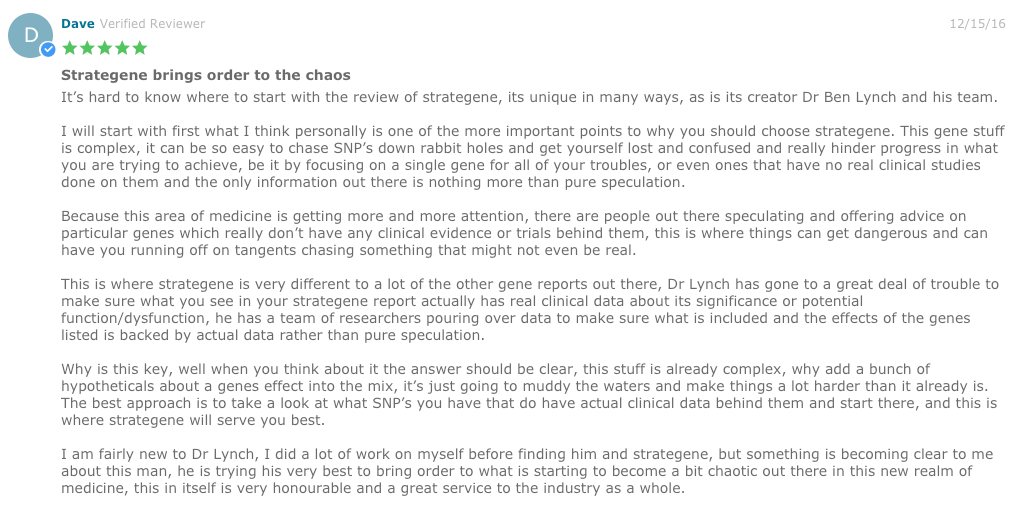
Dave is not alone.
There are thousands of people struggling with understanding their genetic information – and it’s everyone – health professionals included.
This is a new area.
Dave is working hard on trying to understand the bigger picture – and he is succeeding.
Here are some interesting stats from a StrateGene survey that we send out to all users:
- Users: 50.29% Practitioners // 49.71% Public
- Easy to use: 57% Easy // 33% Somewhat Difficult // 9% Difficult
- Usefulness: Very useful 47% // Somewhat 41% // Not at all 1%
- Recommend to Friends: Very likely 60% // Somewhat 31% // No 9%
- Favorite Feature: Common comments are ‘Pathways’, ‘Diagrams’, ‘Referenced’, ‘Visual’, ‘Facebook Group’
Some other commonly heard statements about StrateGene:
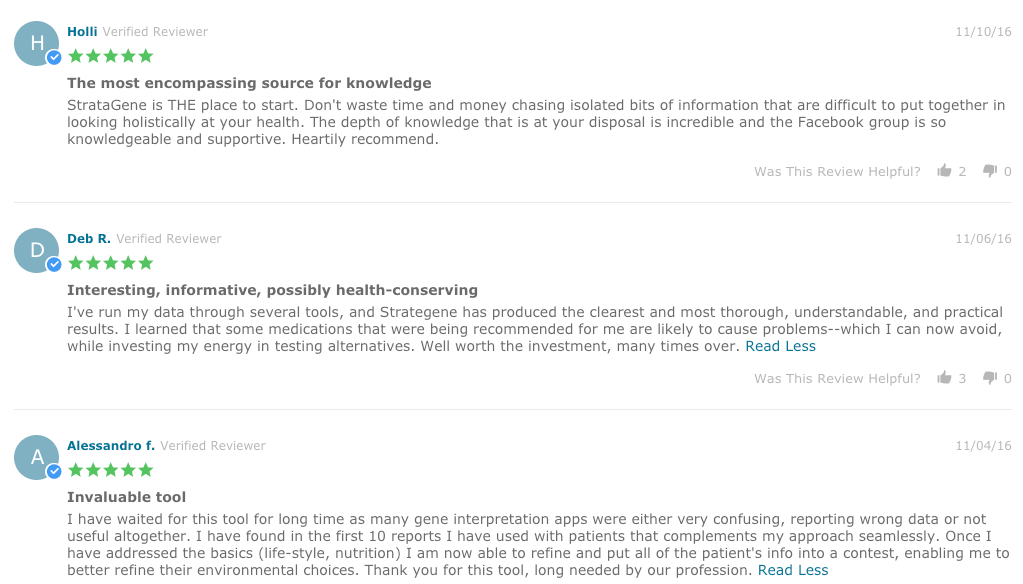
As you noticed from the survey, StrateGene is not for everyone.
9% of StrateGene users are not pleased.
Why?
If you are seeking any of these, then StrateGene is not for you:
- Massive number of SNPs – thinking ‘more is better’
- What supplement do I take?
- No time to learn
- No time to interact with other StrateGene users
- Tell me what to do
I work hard trying to be very open about these points so we don’t have frustrated users. It still happens at times – albeit only 9% of the time thus far.

Example: Sleep Issues and SNPs? A Right Way to Use Genetic Testing
Many people struggle with sleep.
Here is an example of how I used StrateGene to work through why it can be tough to fall asleep.
Many use melatonin for sleep but the melatonin deficiency has many causes.
Instead of searching for a ‘melatonin SNP’, learn how your body makes melatonin and how this process gets disturbed.
That’s the beauty of StrateGene.
Maybe there is a clinically relevant ‘melatonin SNP’, but it really doesn’t matter if you understand how your genes work and how they are affected.
Adding SNPs to this process which are relevant is handy because you know you may be even more susceptible. This knowledge increases your desire to change – which is very powerful.
How to Use A Genetic Report
The first thing we all do – myself included – is look at the list of SNPs which are ‘red’, ‘yellow’ and ‘green’.
I do it because I am looking for genetic susceptibilities.
Many others are doing it because they are looking for what supplement to take.
Thankfully, with StrateGene, when you glimpse at the list of SNPs, you know they are clinically relevant and you don’t have to waste time going down rabbit holes.
The magic of StrateGene though is not just the clinically-relevant SNPs, it is the fact that it is putting it all together for you.
The true gold of StrateGene is the gene-gene-gene-gene interaction and their individual influences all visually mapped out for you – based on peer-reviewed research.
Frequently Asked Questions about StrateGene
We have collected these and have answered them for you.
Here is the collection of FAQ’s and our responses.
Take Home Points About Genetic Testing
Here’s what I would love you to walk away with:
- Genetic expression is mainly based on your daily actions – not SNPs
- Most SNPs are not clinically relevant
- Most genetic testing reports waste your time, money and increase frustration
- Genetic testing should empower you – not scare you
- SNPs are present for a reason – there are benefits to them.
- A lack of a SNP doesn’t mean there is not a problem
- Presence of a SNP doesn’t mean there is a problem
- Genes interact with each other. It is not possible to ‘treat’ them in isolation.
- You can learn this stuff. 50% of StrateGene users are not practitioners and many of them are gaining tremendous insights from it
- Practitioners are as clueless about genetic testing as non-health practitioners because this is a new field.
- There are massive conflicts-of-interest in genetic testing. Be wary.
- It is not possible to supplement your way to health. It takes work.
- There are no stupid questions. There are only wrong questions like ‘How do I fix this SNP?’
- Taking a supplement to fix a ‘SNP’ is not targeted. It may help but it also will likely impact hundreds of other genes as well.
Start benefiting from your 23andMe test, run your raw data through StrateGene.
I will see you in the StrateGene Facebook Group.
You will start really understanding who YOU really are and WHY you are feeling the way you are.
More importantly, you will have a tool which will point you in the right direction vs guessing.
You will have to learn how to use it.
A beautiful piano takes time to learn.
Learn how to play and fine tune your amazing instrument – your body.
What do you think of genetic testing and all the reports out there? Love to hear your comments.

